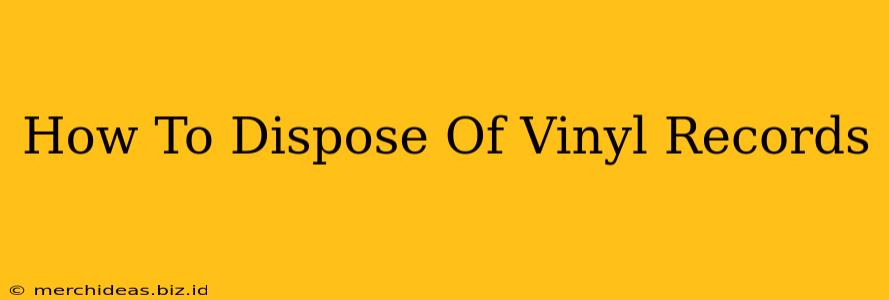Vinyl records, with their warm sound and nostalgic charm, hold a special place in many hearts. But what happens when your beloved collection becomes too much to handle, or you're ready to part ways with some of your cherished albums? Simply tossing them in the trash isn't an option – vinyl disposal requires a bit more thought and care. This guide explores ethical and environmentally responsible ways to dispose of your vinyl records, ensuring you do so with respect for both the material and its history.
Assessing Your Vinyl Collection: Before You Dispose
Before you begin the disposal process, take some time to assess your vinyl collection. This will help you make informed decisions and possibly avoid throwing away valuable records.
1. Identify Potential Value:
- Research: Check online marketplaces like eBay and Discogs to see if any of your records are rare, sought-after, or in high demand. You might be surprised at what some of your seemingly ordinary albums are worth.
- Condition Check: Evaluate the condition of your records. Scratches, cracks, and significant wear can impact value, but even imperfect records can still be worth something to collectors.
- Album Art: Consider the condition of the album art (sleeves and inserts). Excellent condition album art significantly increases value.
2. Sentimental Value:
- Memories: Some records hold immense sentimental value, even if they aren't financially valuable. Consider keeping a small selection of these records as cherished mementos.
- Digitization: If you want to keep the music without the physical record, consider digitizing your vinyl using a record player with a USB output or specialized recording software.
Ethical and Eco-Friendly Disposal Methods
Once you've determined which records you're ready to part with, you can explore various disposal options that minimize environmental impact.
1. Donation:
- Local Charity Shops: Many charity shops and thrift stores accept vinyl records, giving them a second chance to find new homes.
- Record Stores: Some independent record stores might be willing to take your records, either for resale or for their own collections. Call ahead to check their policies.
- Libraries and Schools: Libraries and schools with music programs might appreciate donations of records, especially if they are in good condition.
2. Recycling:
- Vinyl Recycling Programs: While not widespread, some areas have specific programs for vinyl recycling. Search online for "vinyl recycling near me" to find local options.
- General Recycling: In some cases, vinyl can be processed in general recycling streams, but it's always best to check your local guidelines. Note: Vinyl is typically not accepted in curbside recycling bins in many areas.
- Separate Components: Remember to separate the vinyl records from their paper sleeves and cardboard inserts. Paper components can typically be recycled separately.
3. Repurposing:
- Creative Projects: Broken or unwanted vinyl records can be repurposed into unique crafts and artwork. Many tutorials are available online showing how to create clocks, coasters, or other decorative items.
- Upcycling: Consider upcycling the sleeves and inserts into other crafty projects, like notebooks or collage materials.
What NOT To Do:
- Throwing Away in the Trash: Avoid simply throwing your records in the regular garbage. Vinyl is not biodegradable, and it contributes to landfill waste.
- Burning Vinyl: Burning vinyl releases toxic fumes into the atmosphere, posing a health risk.
Maximize Your Vinyl's Value & Minimize Waste:
Disposing of vinyl records ethically and responsibly involves a combination of assessment, careful consideration, and proactive searching for alternative solutions. By taking these steps, you can ensure that your unwanted records find new homes or are disposed of in an environmentally conscious manner. Remember to check local regulations and options before proceeding. You’ll be contributing to a greener planet and perhaps giving someone else the chance to enjoy the music you once loved.
